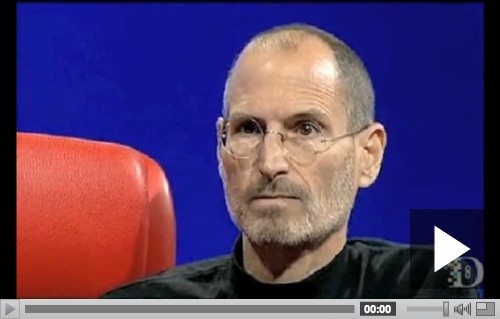Home » Learning Curve » Red Hat Diaries
Thoughts on D8And on Steve Jobs' interview.
Steve Jobs appeared at All Things Digital's 'D8' earlier this month. He was the first interviewee. He spoke for just over one hour thirty minutes and he was fascinating all through. You can browse through other D8 interviews but frankly you'll find them boring.
Not Jobs. From beginning to end you sit glued to your seat, watching and listening.
He's a fascinating man, a deep thinker, and brutally honest. And he answered most of the questions anyone would ask of him today. The interview is one hour thirty five minutes, so there's little point in summarising it here.
Go watch it - click on the link in the picture below.

One of the high points - towards the end - is the following quote. For which he received applause.
Privacy means people know what they're signing up for in plain English and repeatedly. That's what it means. I'm an optimist: I believe people are smart, and some people want to share more data than other people do. Ask 'em. Ask 'em every time. Make 'em tell you to stop asking them if they get tired of your asking them. Let them know precisely what you're going to do with their data.
- Steven Paul Jobs
Take the quote, format it nicely, then frame it and hang it on your wall. That's the credo of privacy for the next ten years. That's what cloud computing and trusting cloud companies is all about. That is how you can and should judge the companies who want you to trust them with your data.
One of the most important issues is where computing is going. Steve explains very lucidly why he doesn't like the enterprise market: the actual users aren't the ones who decide to buy your products and those who do decide are often ill-informed.
He also believes we're moving away from the PC - the 'PC' in the broad generic sense of the 'personal computer', be it a Wintel box or a Mac. We're moving towards mobile devices, smaller devices, like the iPhone and the iPad. He wouldn't give a timeline but he believes it will happen.
He was asked if the iPad was good enough for 'content creators'. A Bluetooth keyboard might be necessary on rare occasions, he said, but most of the time the iPad will be sufficient.
So it's not an entirely academic question to ask if the iPad can become a bootstrap device - if Xcode will fit and work on it so developers don't have to switch from one machine to another. There's also a security angle there of course.
Driver writers always work with two machines. Driver writing is difficult and burdensome and this is one of the reasons. What's interesting is to see how much the iPad can become a 'bootstrap' system. They won't want to keep switching from one box to another to develop an application with a $5 price tag.
Steve comes back time and again to clarify his one purpose at Apple: to create the best possible products. He's very convincing. The picture he paints of how things really work inside Apple is also very fascinating. He calls the company the world's biggest startup: no hierarchy, just the free flow of ideas.
But here are a few questions someone might like to ask him.
√ How much of a market share did Microsoft have on the desktop in 1997?
√ OPENSTEP was the best possible product in 1997 - why not release it then?
√ Why wait five years to release a good version of Mac OS X? Was it really necessary to rebuild the entire system? What were the advantages that so outweighed the disadvantages of letting Microsoft win hegemony with Windows and thereby catapult the young World Wide Web into the confusion it's in today, with bugs and worms and trojans and botnets galore?
No one can know better than Steve Jobs what the options were back in 1997, and what kind of thought and market research went into the decision to back out of earlier plans to release OPENSTEP on the open market, available to all OEMs, and possibly knock Microsoft off the hill before they got too smug up there.
The one thing one can criticise with Apple's success is that they had the chance to rid the web of Microsoft and didn't take it.
|